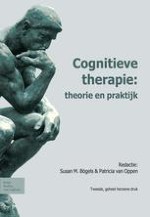
2011 | OriginalPaper | Hoofdstuk
1 Cognitieve verwerking en psychopathologie: theorie en onderzoek
Auteurs : Filip Raes, Merel Kindt, Arnoud Arntz
Gepubliceerd in: Cognitieve therapie: theorie en praktijk
Uitgeverij: Bohn Stafleu van Loghum

2011 | OriginalPaper | Hoofdstuk
Auteurs : Filip Raes, Merel Kindt, Arnoud Arntz
Gepubliceerd in: Cognitieve therapie: theorie en praktijk
Uitgeverij: Bohn Stafleu van Loghum
Print ISBN: 978-90-313-8309-2
Elektronisch ISBN: 978-90-313-8310-8
Copyright: 2011